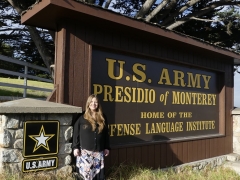Putting Research into Action to Redesign Curriculum at the Defense Language Institute
| by Jessa Zerpoli
When Claire Eagle completed her degree in teaching foreign language, her dream was to teach at a school like the Middlebury Institute. Now she’s redesigning curriculum at one of the biggest language schools in the world.




